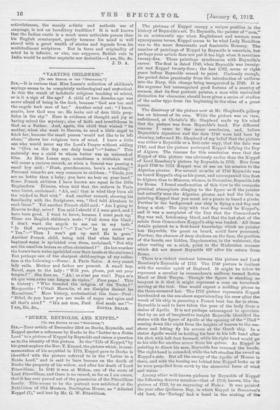" VARYING °MILDNESS."
[To THE EDITOR Or THE " BruTATon."] Ent,—It, is curious that Miss Loane's collection of children's sayings seems to be completely untheological and unpoetical. Is this the result of indefinite religious teaching at school, or is it a sign of the age P A child of two decades ago was never afraid of being in the dark, because " God saw her and the angels took care of her." Another cried out: "I know, auntie, how God sees us : He looks out of dem little peep- holes in the sky." Here is evidence of thought and joy at having solved the mystery ; also of faith and trustfulness iu God as a Father. And, again, the child that wished " its mother, when ebe went to Heaven, to send a little angel to fetch her, because the small person ' would not like to be left alone,' " shows her religious turn of mind. I knew a little one who would never say the Lord's Prayer without adding to " Give us this day our daily bread "—" butter." This naturally was a child to whom butter was an unheard-of bliss. As Miss Loane says, sometimes a mistaken word will cause a curious remark, as when a funeral was passing a small boy said : " Hush, grandmamma, here's a wedding !" Personal remarks are very common to children : " Uncle, you are no better than a baby ; you have no hair on your head." Some French children I have known are equal to the little :Englanders. Etienne, when told that the ordures in Paris were burnt, exclaimed: " Ah, oui ! that is what they burn all the wicked in Hell with." And another remark, showing his familiarity with the Scriptures, was, " God told Abraham to cook Isaac." Yet another French child said : " Am I going to Heaven to-day, mere P You said I should if I were good, and I have been good. I want to know, because I must pack up." These are English children's mots: " Pull down the blind ; I don't want the angels to see me in my bath." " Is God everywhere P "—" Yes."—" In my room P "- " Yes."—" Then I won't get up until He is gone." Another French child, being told that when babies are baptized water is sprinkled over them, exclaimed, " But why are the omnibus horses so often christened P" (In hot weather the horses have water sprinkled over their heads at the stations.) But perhaps one of the sharpest child-sayings of my collec- tion is the following :—Scene : A Paris Salon. A very smart lady calls. Mother and father are present. A small boy, Raoul, says to the lady : " Will you, please, put out your tongue P " She does so. " Ah ! co n'esb pas vrai I Papa m'a dit que Tons aviez tine longue de vipere." Poor papa 1 This is history : " Who founded the religion of the Turks P" Marguerite : " ()Wait Marmite, et sea disciples etaient les Marmitons." More history, ecclesiastical this time—Paul : "Ethel, do you know you are made of sugar and spice and all that's nice P " " It's not true, Paul. God made mo I" —


















































 Previous page
Previous page